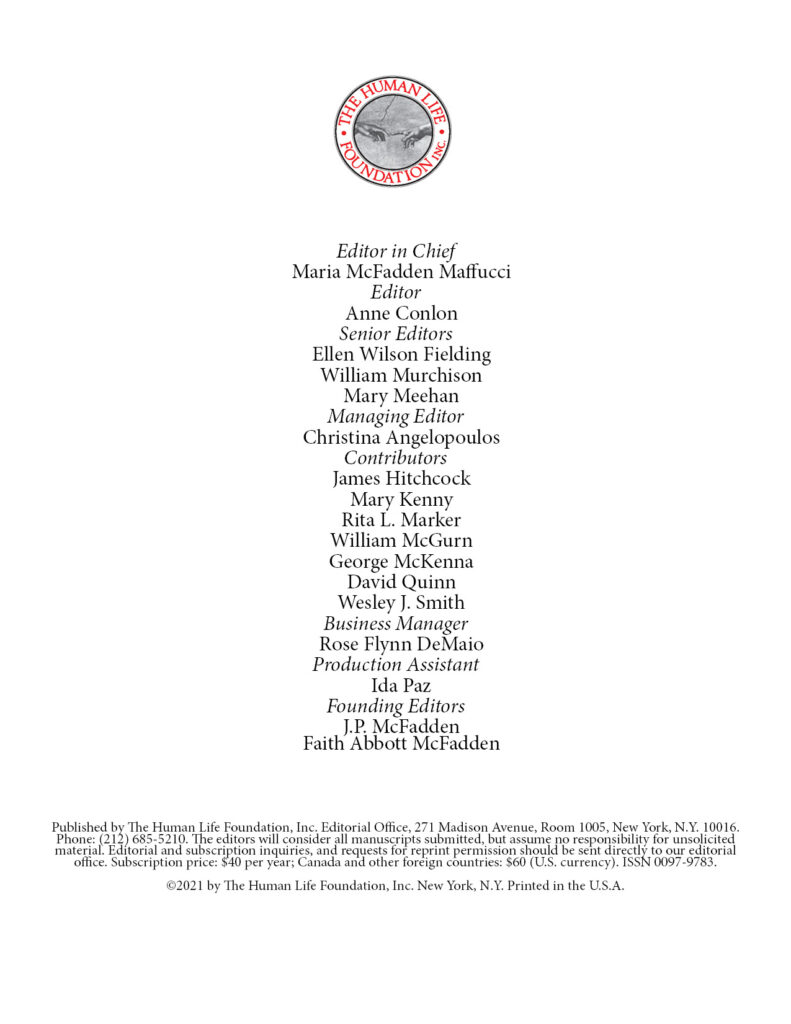|
|
 -
About this issue…
. . . Masks off? In the blooming of spring comes new hope that we can start inching back to some kind of normal living. Masks, which protect, also cover up, and in this issue our contributors do some serious unmasking. We welcome new contributor and veteran journalist Julia Duin, who asks “Is Joe Biden Only Quasi-Catholic—At Best?” (p. 11). Seems the photo of Pope Francis displayed in the presidential office can’t hide the fact that Joe’s abortion advocacy makes him a Catholic who brazenly flouts one of the Church’s most sacred beliefs. In “Big Abortion v. David Daleiden” (p. 19), Alexandra DeSanctis reveals the roles both Kamala Harris and Xavier Becerra—in their respective terms as California’s attorney general—played in the cover-up of Planned Parenthood’s criminal trade in fetal body parts and the persecution of Daleiden, whose undercover videos unveiled the horrors. Diane Moriarty (“Pepé le Cuomo,” p. 82) and I (“Don’t Forget Andrew Cuomo’s Other Coronavirus Victims” p. 94) expose the ugly mug behind the mask
of New York’s governor, who pontificated about the value of each human life during his famous Covid press conferences while quietly implementing policies that sent thousands of the elderly and disabled to their deaths. (Our thanks to National Review Online for permission to reprint the latter.)
Both flagrant lying and manipulative distortions are necessary to promote the abortion culture, as Robert Marshall (“Lies That Keep Abortion Legal,” p. 30), Lyle R. Strathman (“What About Pro-Choice?”, p. 42), and Denise M. Leipold and Raymond J. Adamek (“Ignoring Surgical Abortion’s Effect on Infant Mortality in Ohio,” p. 52) deftly demonstrate.
Truth-telling is indeed our mission, and you will find a lot more of it on our website (www.humanlifereview.com), which we have recently expanded with two new features. In “Insisting on Life” I share commentary, news items, and reviews, and every Sunday we have “Pastoral Reflections”—Rev. W. Ross Blackburn, who originated the column, is now joined by a rotating, ecumenical roster of clergy and religious.
Finally, some sad news came this spring: Paul Greenberg, Pulitzer prize-winning journalist, long-time editorial page editor of the Arkansas Democrat-Gazette, Review contributor, and Great Defender of Life honoree, died on April 6 (see remembrance on p. 96). Greenberg once “welcomed” Roe v. Wade, but then he not only converted to the cause of life but became one of its most eloquent defenders. His words (in accepting his award, October, 2011) live on:
Maybe once in a generation a great issue arises—a watershed issue. One that can no longer be put off, compromised, blurred. One that will no longer be denied. But returns again and again. With the obdurate force of a moral conviction. Slavery was such an issue. Civil rights were such an issue, and it led to a Second Reconstruction. If the distinguished jurists of the U.S. Supreme Court thought they could end this discussion, they couldn’t. We have only begun to fight; to speak, to witness, and we will be heard.
Maria McFadden Maffucci
Editor in Chief
-
Carl R. Trueman’s The Rise and Triumph of the Modern Self: Cultural Amnesia, Expressive Individualism, and the Road to Sexual Revolution was published last fall to wide conservative acclaim. First Things editor Rusty Reno called it a “profound and lucid book.” Rod Dreher, who wrote the Foreword, said its “significance . . . is hard to overstate.” Our senior editor William Murchison, whose review essay leads this issue, is also full of praise. Trueman’s “justly celebrated study” of “our culture’s contradictions and perplexities,” he writes in “Calling Nonsense by Its Right Name,” is “a searching account of the civilizational crisis before us,” and one that “necessarily provokes the question: What’s going on here, Lord? And what can we do?” On the subject of “what we can do,” however, he detects a certain “pessimism” in the book, which is “much in tune with a current strain of commentary suggesting a great drawing inward among Christians as they perform good works and spread love until the arrival of more fruitful times.” Murchison’s faith in evangelization—as practiced by second-century Christians—should encourage a fruitful debate.
Startled observers are asking “What’s going on here, Lord?” as a rosary-waving president casually consigns Church teaching to the ash heap of his-story. In “Is Joe Biden Only Quasi-Catholic—At Best?” veteran journalist Julia Duin looks at the early months of the new administration “through a Catholic lens,” and most of what she sees isn’t copacetic. Biden “had to have known,” Duin writes, that his “surrender on the Hyde Act” and his proposal to “codify Roe v. Wade . . . in a form of a law that can’t be fiddled with by the Supreme Court” would create discord. And then there’s the Equality Act: “Biden backs it to the hilt.” Which means he backs foisting a transgender curriculum (not just bathrooms) on Catholic schools. Does he think “plunking down a photo of Pope Francis in the Oval Office,” will cancel outspoken clerics like Archbishop Joseph Naumann, who has “told EWTN the president’s soul is ‘in jeopardy’”? Duin, who is not Catholic, does have bracing advice for would-be wobbly prelates: “Speak truth to power,” she tells them. “Being prophetic to the Biden administration may cost the Church . . . that’s when the world will begin to listen.”
Read Full Intro
|
